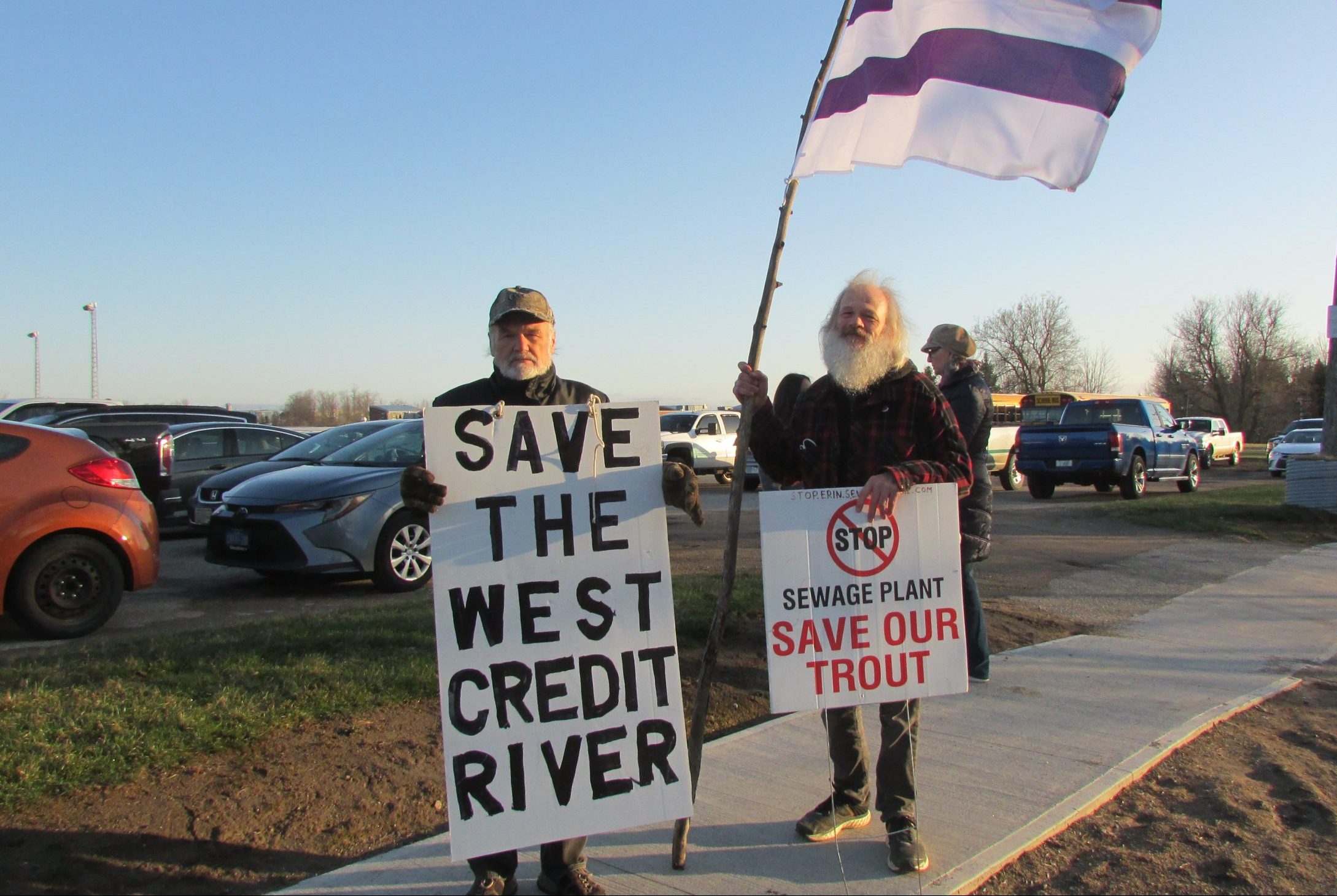ERIN – The town’s controversial wastewater treatment plant was one of the topics of conversation at the Erin Mayor’s Breakfast Friday morning.
Two individuals concerned about the proposed wastewater treatment plant took to the street outside of the Erin Legion to voice their concerns, while inside, Mayor Allan Alls was accompanied by local community members and elected officials.
Those opposed to the plant were peaceful and cordial as passing cars and attendees made their way by, some offering a supportive wave and honk.
The protesters held signs reading “save our trout” and “Save the West Credit River.”
Among the protesters was Ken Cowling, a resident concerned with the amount of effluent set to be discharged into the West Credit River once the plant is constructed.
“To me, I find it archaic to put 7.2 million litres of fluid into the West Credit River when there’s alternatives of ingrown infiltration,” he told the Advertiser.
“But unfortunately, this has gone through an environmental assessment that has passed and there are groups that have found flaws in this original environmental assessment, and especially the assimilative capacity of the river.”
Cowling said he’s been on the river for seven decades and it holds a special place for him.
“I’m trying to pass the legacy on to not just my kids and my grandkids, but all future generations around here,” he explained.
“I’ve been blessed with this area.”
The other protester, Kevin Guian, said while the environmental impacts are on his mind, he’s also concerned about the larger issue of including Indigenous groups in the conversations when it comes to projects like this.

Mayor Allan Alls, accompanied by local community members and elected officials, held his Mayor’s Breakfast event on April 22. Photo by Paige Peacock
“Everyone south of the of this water treatment plant has the rights to be able to sustain themselves by what’s in the river,” he explained.
“Indigenous people have the right, and we have a responsibility and the responsibility is to include.
“And then once that inclusion happens, then all these other things fall into place because they plan on seven generations, we plan on four-year election cycles.”
Guian said he’s not asking the town to redo all the environmental and related assessments that have been done, but to prove that there has been inclusion of the Indigenous voice at the consulting table.
“If you don’t have a response, that’s not permission,” he said. “It’s not consultation.”
He added it’s about the Haudenosaunee, the Mississaugas of the Credit First Nation and all the surrounding nations and tribes.
“This is Erin, the small community of Erin, but it’s the planet, so it’s ‘think globally, act locally,'” he explained. “That’s really that’s the importance.”
Meanwhile, inside the event, Alls stressed the need for the plant in order to support anticipated population growth the town will be faced with in years to come.
Thanking council for their support during his time as mayor, Alls said “we have done many amazing projects for Erin, such as the wastewater treatment plant, in order to properly wean into the forecasted growth the province expects us to attain.
“We can’t have a growing population, employment and development without the treatment plant.”
Guest speaker and Wellington-Halton Hills MPP Ted Arnott also voiced his support for the treatment plant, stating “the Town of Erin needs a communal wastewater treatment system and I fully support the town’s proposal to build it.”
He added the government “needs to have a program that provides financial support for communities like Erin to offset the costs of hookups to the new system for existing residents and businesses.”
Following Arnott’s speech, Alls announced the town has successfully attained a $3.6-million grant from the Ministry of Infrastructure for the wastewater treatment system, which will be used for pipelines that will connect existing properties within the urban boundary to the treatment plant.
The town has previously noted there will be no cost to rural residents as they will not be connecting to the system.




